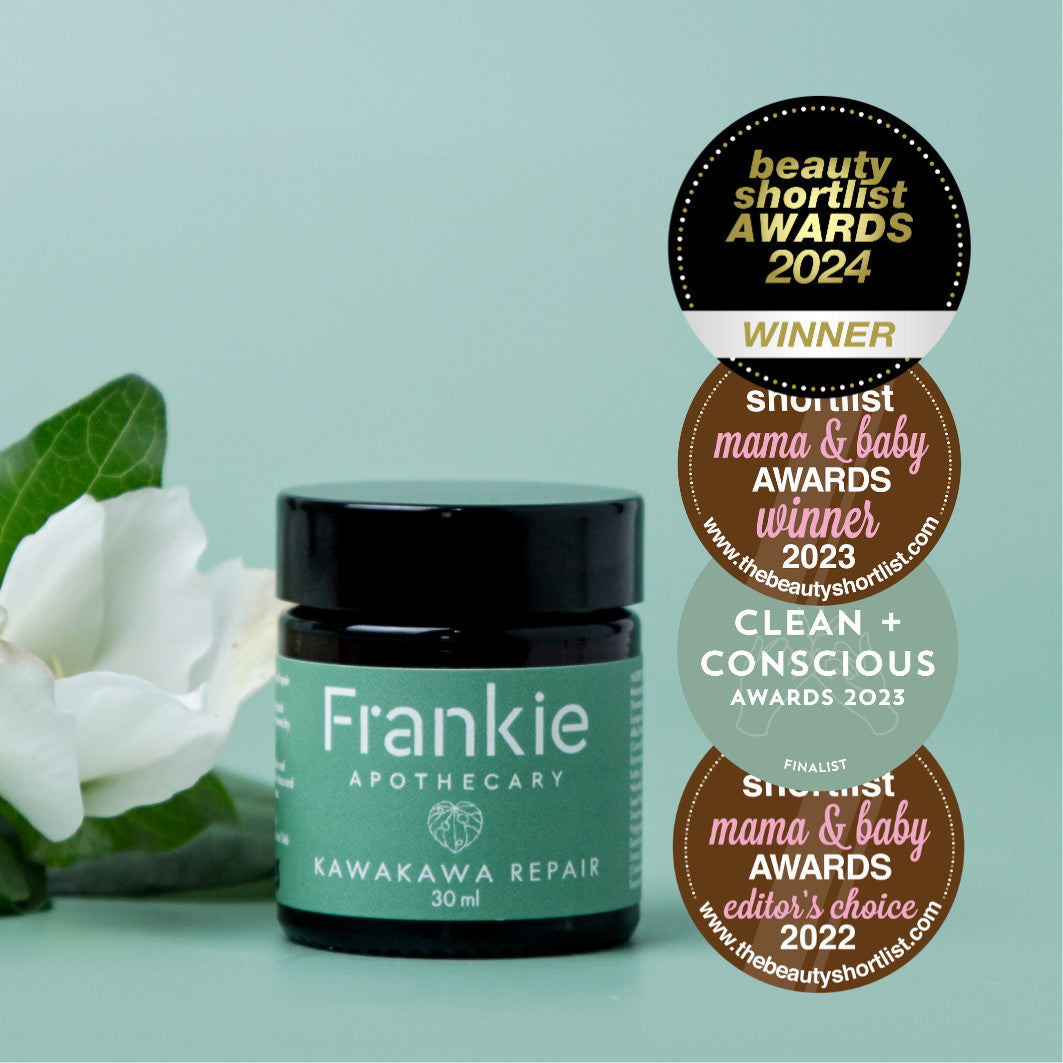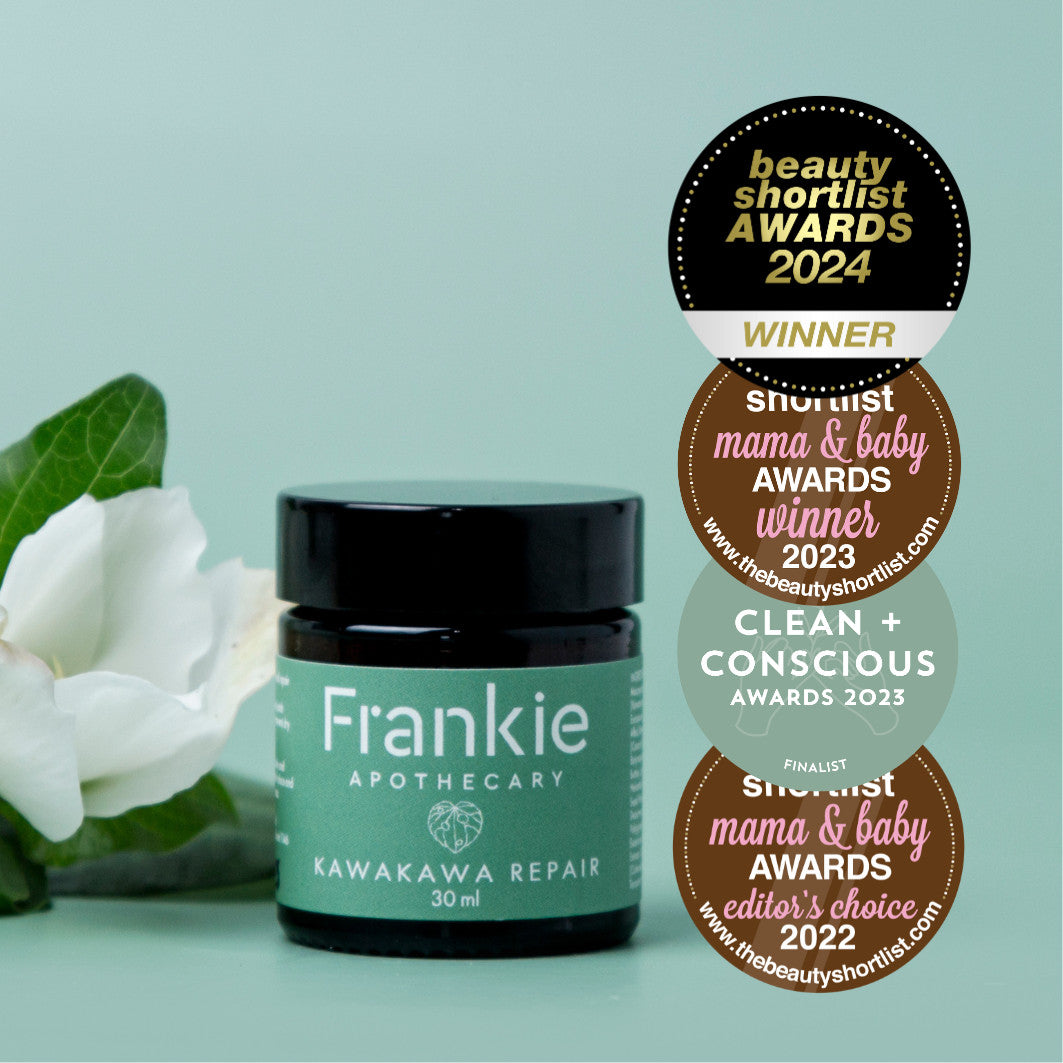You've probably heard that gut health plays a big role in skin health. You've probably also heard that cutting down inflammatory foods such as sugar, gluten and dairy can help reduce gut inflammation and calm dry, itchy skin conditions from the inside out.
If you're anything like us, it's awesome to know something happens, but you also want to know why and how the gut influences skin health. And more importantly, practical everyday steps to boost good gut health for every member of your whānau.
When your three year old is begging for that chocolate or really wants that croissant when you've decided to go sugar and gluten free, knowing why you're holding the line can really help.
Getting a handle on gut health isn't just important for skin health, it's massively crucial for wellbeing - mental health, concentration, focus, keeping regular and even being able to sleep at night. Good gut health can be truly transformative.
Your gut is having a kōrero with your skin and vice versa
The gut-skin axis is the name for the two-way 'conversation' between your gut and your skin. 'Talking' takes place via signals from the immune system, inflammatory compounds or mediators, hormones and metabolites (molecules from chemical reactions in the body). When they're released, they tell a story about what's happening in one system, which influences the health of the other.
Good bacteria tell your immune system to fire up or calm down
Good bacteria promote the production of cells that reduce inflammation such as regulatory T-cells (a type of white blood cell), which can reduce skin inflammation. Too much bad bacteria can promote too many pro-inflammatory immune cells, making things like eczema, psoriasis and acne worse.
Good bacteria help keep the skin barrier strong
When good gut bacteria feed on dietary fibre, they produce short chain fatty acids (SCFAs) such as butyrate, propionate and acetate which have an anti-inflammatory action and help keep the skin and gut barrier strong. Too few SCFAs and the skin barrier is weakened and the skin can become dry, irritated and prone to inflammatory conditions.
A healthy gut barrier stops toxins getting through
When the gut barrier is healthy it stops harmful substances getting into the bloodstream, where they can reach the skin, disrupt the skin barrier and trigger inflammation. This has been linked to the skin drying out, skin cells not maturing properly and chronic inflammation.
Also, some metabolites made in the gut can travel through the bloodstream and affect which microbes can thrive on the skin, which can influence skin health for good or bad.
Ok, so there's they why and how. Now to the what.
What are immediate steps you can take to boost gut health?
1. Eat the colours of the rainbow: Fruit and vegetables give fibre and polyphenols which feed good gut bacteria - especially vegetables. Think carrots, cabbage or frozen corn and frozen green beans if fresh alternatives aren't available.
2. Eat fermented foods: Yoghurt, kefir, kimchi, sauerkraut and kombucha introduce live bacteria - probiotics - to your gut.
3. Drink lots of water: Staying hydrated supports digestion and a healthy gut lining.
4. Avoid ultra-processed foods: they can disrupt the balance of gut bacteria and promote inflammation. For seed oil free snacks, Serious has the market cornered and you can find them at most supermarkets. Their chocolate popcorn is super popular.
5. Chew food well: This improves digestion and nutrient absorption, helping the gut to be more comfortable.
6. Manage stress: Stress hormones inhibit the growth of good bacteria while making it easier for harmful bacteria to thrive. Try calming activities like a meditative walk, belly breathing and prioritising sleep.
I visited my functional medicine doctor last month and he made the point that 60% of wellness comes down to lifestyle factors. Getting enough sleep, being mindful and focussing on the moment to help calm body and mind, prayer, contemplation or meditation, choosing nutrient-rich food. Not everyone can afford an expensive supplement regime, and if that's the case, he said he always focuses on food and lifestyle tweaks as they are the single biggest factor in wellbeing.

Thanks to Jan Landau on Unsplash for the beautiful image.
If you have a history of coeliac disease in the family or other auto-immune or chronic conditions, it may be helpful to have your gut microbiome assessed and a tailored course of probiotics prescribed to help get your gut health back on track. We know that can be pricey, but if you've tried your own approach and haven't seen results yet, an excellent naturopath or functional medicine doctor could be really helpful.
We hope you've found these tips helpful and can weave in one or two changes into daily life right away.
To take a deeper dive into the role inflammation plays in dry, itchy or eczema-prone skin, take a look at this blog by Warren from Be Pure on Healing eczema from the inside.
Have you had success with probiotics or a gut health programme before? Please let us know what you found helpful below.
References:
Codoner, F. M., Ramirez-Bosca, A., Climent, E., et al. (2018). The role of gut microbiota in the pathogenesis of psoriasis and psoriatic arthritis. Journal of the European Academy of Dermatology and Venereology, 32(8), 1336-1343. https://doi.org/10.1111/jdv.14918
Cryan, J. F., O’Riordan, K. J., Cowan, C. S. M., et al. (2019). The microbiome–gut–brain axis in health and disease. Physiological Reviews, 99(4), 1877-2013. https://doi.org/10.1152/physrev.00018.2018
De Pessemier, B., Grine, L., Debaere, M., et al. (2021). Intestinal permeability and skin disorders: The gut-skin axis. Frontiers in Immunology, 12, 672426. https://doi.org/10.3389/fimmu.2021.672426
Foster, J. A., & Neufeld, K. A. M. (2013). Stress and the gut microbiota-brain axis. Nature Reviews Gastroenterology & Hepatology, 10(6), 396-404. https://doi.org/10.1038/nrgastro.2013.35
Kim, C. H. (2021). Role of short-chain fatty acids in skin health and disease. Allergy, Asthma & Immunology Research, 13(4), 548-562. https://doi.org/10.4168/aair.2021.13.4.548
Koh, A., De Vadder, F., Kovatcheva-Datchary, P., & Bäckhed, F. (2016). Short-chain fatty acids: microbial metabolites that alleviate inflammation and promote gut homeostasis. Nature Reviews Gastroenterology & Hepatology, 13(10), 661-678. https://doi.org/10.1038/nrgastro.2016.190
Marco, M. L., Heeney, D., Binda, S., et al. (2017). Fermented foods, the gut microbiome, and health: A systematic review. Nutrients, 9(8), 968. https://doi.org/10.3390/nu9080968
O’Neill, C. A., Monteleone, G., McLaughlin, J. T., & Paus, R. (2016). The gut microbiome as a major regulator of the gut-skin axis. Frontiers in Microbiology, 7, 1149. https://doi.org/10.3389/fmicb.2016.01149
Salem, I., Ramser, A., Isham, N., & Ghannoum, M. A. (2018). The gut-skin axis: current knowledge of the interrelationship between microbial dysbiosis and skin conditions. Frontiers in Microbiology, 9, 1459. https://doi.org/10.3389/fmicb.2018.01459
Valdes, A. M., Walter, J., Segal, E., & Spector, T. D. (2018). Diet and the gut microbiome: From hype to hypothesis. Nature Reviews Gastroenterology & Hepatology, 15(12), 723-740. https://doi.org/10.1038/s41575-018-0061-2



















